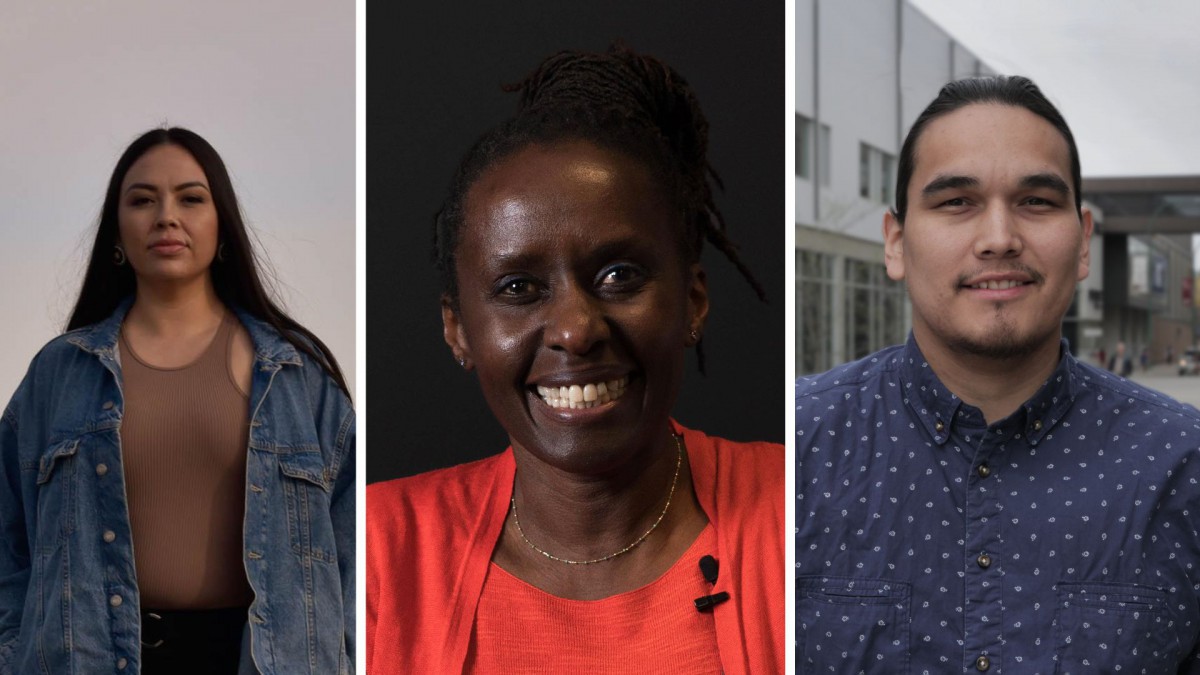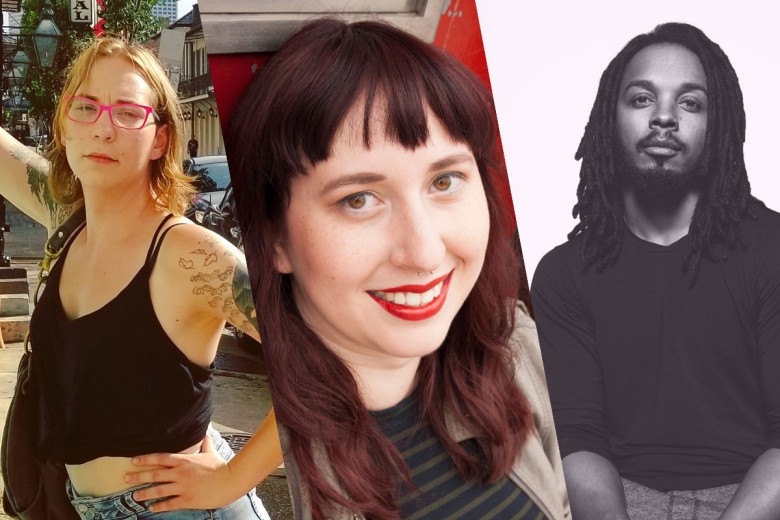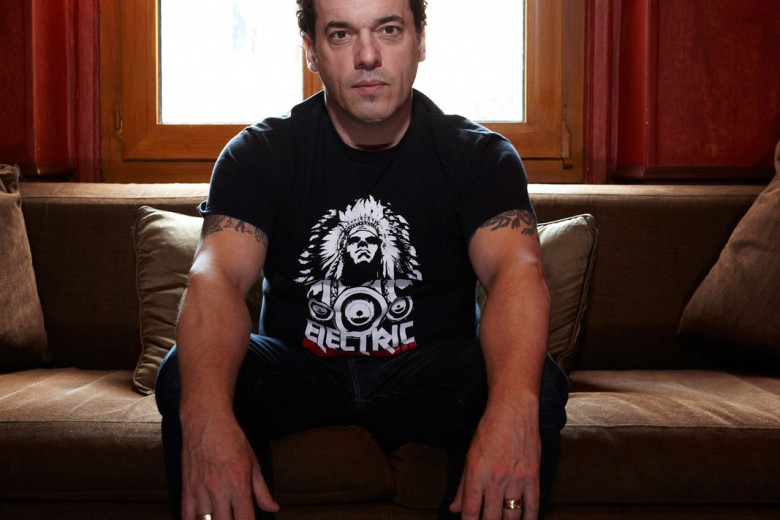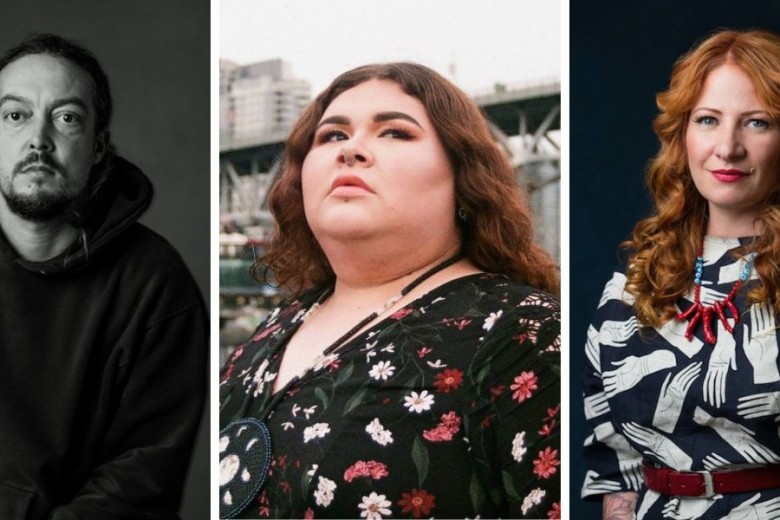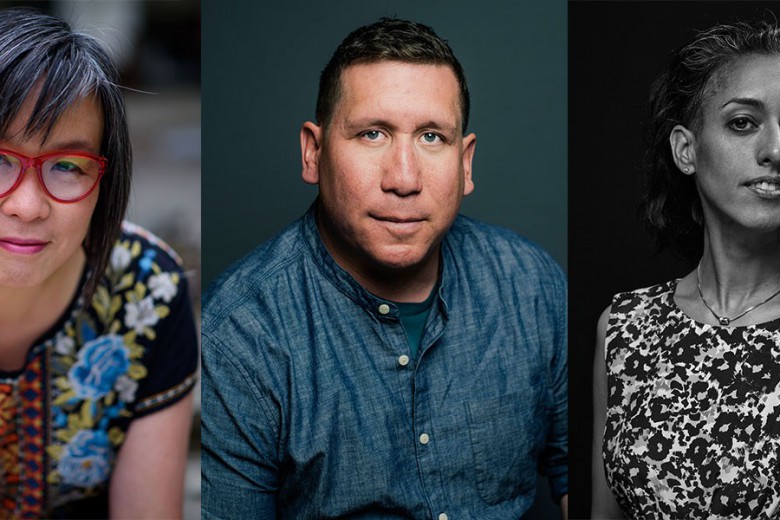Briarpatch’s annual Writing in the Margins contest is back for its 13th year, spotlighting new poetry, creative non-fiction, and photography that bring to life issues of social and environmental justice.
This year, we have a very exciting panel of judges: Helen Knott will judge creative non-fiction, Juliane Okot Bitek will judge poetry, and Kevin Settee will judge photography.
You have until November 20, 2023, to enter the contest – details on how to enter can be found here. It costs $25 to submit (which also gets you a one-year subscription to Briarpatch) and we have bursaries that allow 10 low-income writers and artists to submit for free. Winners are published in Briarpatch Magazine and receive $500 each in prizes; runners-up are published on briarpatchmagazine.com and receive $150 each.
Alex Birrell asked the judges about the role of art in social movements, their latest projects, and the art to which they keep returning.
Meet the judges:
Helen Knott is the mom of a teenager, a mediocre beader, and was a Rez leg wrestling champion in 1999. Her first book, In My Own Moccasins, was a national bestseller, and her new memoir, Becoming a Matriarch, was released in August 2023.
Juliane Okot Bitek is a poet. She lives in Kingston on the land of the Anishinaabeg and Haudenosaunee people. She has published three books of poetry, most recently Song & Dread (Talonbooks, 2023).
Kevin Settee is an Anishinaabe/Cree community filmmaker with family and deep community connections across the Lake Winnipeg area. His family roots are in Fisher River Cree Nation, Matheson Island, and Dauphin River. He grew up in Winnipeg’s West End and has experience in community organizing, student politics, digital media, and Indigenous rights activism.
What do you think is the role of art in building communities and fueling social movements? When was a time you felt like your creative work has been part of a movement?
HK: Art is a crucial part of social movements because people are reached and provoked into thought or action through various mediums. Art also fosters connection and often will help break down the isolation we sometimes feel.
I’ve had poetry read out (by someone else) on Parliament steps and was able to do spoken word with CBC as well as talk about issues related to land and body through a CBC short doc. I have academic pieces published in books as well. I really believe that it takes a lot of different formats to build a public consciousness about issues.
JOB: I’ll be the skeptic here as I attempt to answer this one. Art gets to be used for and against, to oppress and uplift, guide and misguide. It feels like a question that relies on one’s proximity to power or comfort. I’m always hesitant about the idea that art can absolve. Often, it can provide a place to go, escape to, hope, etc., but too often, it’s also the place where ideas about other people and places have been propagated and are still imposed. I think about Rudyard Kipling’s “White Man’s Burden” and how a worn copy of it is posted in the home of a generous couple I know that have never had to think about the poison of that poem.
Helen, your latest memoir is titled Becoming a Matriarch and your website is called Reclaim the Warrior. What does it mean to become? To reclaim? And how can the written word facilitate the process of becoming and reclaiming?
HK: For myself, becoming is about letting go of the idea of who you are and allowing yourself to emerge as someone new when faced with change. I frame reclaiming in an Indigenous context and to me it means that I am reintegrating tribal knowledge, values, and ways of being in the world. Reclaiming is about things that once were. Becoming is a transformation and is about what will come to be.
Writing has helped me evolve because it forces me to sit with thoughts and emotions I would rather not have a conversation with. Difficult internal dialogues are a crucial ingredient for the alchemy of becoming. By reading other people’s work, I’ve benefited from learning from the pathways they have navigated.
Juliane, what role does art and poetry play in the preservation of collective memory?
JOB: Poetry and art (can poetry be art?) are cultural productions, and so this makes the question sound like: how does culture humanize us if we think about memory as an aspect of what makes us who we are? My book 100 Days began as a collaboration with Kenyan-American artist Wangechi Mutu, who had started a photo a day for 100 days project in early April 2014. I joined her in writing a poem a day for 100 days, responding to the meaning of memory two decades after the genocide in Rwanda.
Collective memory work is complicated and political because it demands that we consider what we choose to bring into the present and take into the future – and how that shapes us. The failure of memory and language along with the demands of the powers that be makes for a complex space and tension, and I believe this is where art and poetry might offer a space for us to think about what we have come through. Poetry can be a careful crafting of words that helps us to orient ourselves and offer an alternate language to register the past, and in the case of the 100 Days project, poetry can be an invitation to think about the work of memory.
Photographing and recording people and communities can be a very intimate act.
Kevin, how do you build the kind of trust necessary for people to be willing to allow you to capture them in such a way?
KS: I believe setting intentions at the beginning of a project is valuable if you do not know the people in the community. It’s important to always let people know who you are and where you are from, what the project is, and how the photos or media are going to be used. I follow OCAP (ownership, control, access, and permission) principles, which includes letting people know they have full access to the media once the project is complete.
If the community you’re working in knows who you are, I think still letting people know what your intentions are and how the media is going to be used is important. I believe that photographers and filmmakers should be from the communities they are documenting, or that they should be working with and including people from the community on productions.
Constant consent is also important when working on a project. Some people who’ve been recorded previously might not be comfortable being recorded or photographed again without consent, so always asking if it’s okay to take a photo is important to me.
Is there a particular moment you can recall, book you read, or photograph or film you saw that made you think, “I want to do that”? What was it?
KS: I always loved watching movies. I think my love of movies comes from my childhood. My grandmother was a photographer and she always had a camera on her. She used to make me photo albums of our travels to our cabin on Lake Winnipeg that I still have to this day. I always bought disposable cameras because of that early introduction to photography.
HK: Not necessarily – I think it was always there. Before I could read or write, I would fill lined paper with orderly scribbles. There were pages and pages of pretend writing, all in lines as if the loops and dips formed some cryptic story that only I could understand. On my first day of kindergarten, I came home terribly upset and when asked why, I said, “because I didn’t learn how to read.” I guess I have always been enamoured with the literary world and writing just made sense.
JOB: I was first a reader and I still am. I’ve always loved being inside a story, not necessarily writing one. At school, I did quite well in history, art, and literature, but I never thought about myself as a storyteller, writer, and poet. I’m not sure that I can think of a single book that made me want to be a writer, but I can think of many writers who taught me about writing as necessary work. I always think about Toni Morrison’s teaching about writing the book that you want to read as a way of thinking about what stories are not being written, or not being written in the way that you’d like to see. I think about my father, also a writer, who taught me that the responsibility of the artist is to tell the truth. I also think about how impactful it has been to read many kinds of writing by many kinds of writers, so we don’t have to rely on a few. A book that I’ve always wanted to respond to is Joseph Conrad’s Heart of Darkness, but rather than make me a writer, it makes me appreciate how powerfully a book can impact how folks are understood as being without voice or agency, and I want to write against that.
Rapid-fire round
What’s the first piece of art you can remember making?
HK: Probably a hand turkey.
JOB: A small bust of the first Kenyan president, Jomo Kenyatta, with clay. I remember what a glorious experience it was moulding the clay and shaping it from a lump to (what I thought was) the recognizable figure. It was a lazy weekend afternoon and sunny outside and the clay felt good; nothing else mattered. I think I was in Grade 3 and I was so proud of it.
KS: I remember buying a disposable camera when I went to a camp on Lake of the Woods for sick kids. I took a bunch of photos. I went kayaking by myself and took pictures of the water and birds. It wasn’t the first thing I ever made but it is the first thing I was really proud of.
What piece of writing or art do you find yourself returning to year after year?
HK: There are a few books I pick up when I need to feel moved by beautiful writing, or to feel like anything is possible, or to feel completely wrecked by life. In no particular order: Son of a Trickster by Eden Robinson, On Earth We’re Briefly Gorgeous by Ocean Vuong, The Witches of New York by Ami McKay, and How We Became Human by Joy Harjo. I also just finished reading When We Were Sisters, written by Fatimah Asghar, and I will return to that story for its ability to lyrically break me open.
JOB: For a long time, it was Joseph Conrad’s Heart of Darkness. I’ve taught it many times, read critical responses to it, and written a response to it. In my collection A is for Acholi, I finally dealt with the powerful haunting of that novel and I spent a good chunk of time writing poetry that reclaims the African woman from that novel as someone with language, agency, and presence.
KS: I always find myself returning to late author Richard Wagamese. His novels and books were the first books I really enjoyed and literature I connected with on a spiritual level.
What do you think is overrated in writing or art?
HK: One person’s sense of what is overrated is what another might deem necessary.
JOB: The idea that art or writing can be valued monetarily. I think that we support all artists and writers so that they can focus on the work of making art and writing, rather than to create art or writing as tradable commodities.
KS: I never understood or cared about Shakespeare. I started reading Wagamese around the same time I was introduced to Othello in high school and just couldn’t stand the Shakespeare readings in classes. I thought I’d much rather learn about my own people, our stories, and our languages.
What helps you get into the mood to write?
HK: I find a song that matches the mood of what I am trying to write and have it on repeat for the entire writing session. If I just don’t want to write, I watch or read something that makes me feel all the feels. Now, if I am really struggling to write, I change up my routine, or go to the water and lay an offering, or go catch a sunset in the valley.
JOB: I’m never, ever in the “mood to write.” I’d much rather be inside a story or be in the world. I often have to write when I get an idea that’s niggling away in my brain and I can’t focus on anything else so I plonk myself down and write. Deadlines are a great motivator, as is the need to tackle a question which I can only do in writing. Writing is never a mood for me.
KS: I really need peace and quiet to write, and I need to have a major sense of purpose for writing.
How do you know when a piece is complete?
HK: This is a trick question, right? I will always find something to rewrite. As human beings and writers, we are forever shifting, so in that sense a piece could never be done. We just have to stop protecting our egos and let our literary babies enter into the world.
JOB: Sometimes I only know because someone else tells me. Recently, I learned that a piece I was working on was complete long before I thought it was. Another time, I had three poems that I thought were done but an editor showed me that they still needed work. I suppose I’m trying to say that writing is often collaborative and I learn much about what I’m doing through the editing process. Sometimes the narrative that goes through my head is done and there’s no denying that it’s finished. It just feels right and then I turn to editing it.
KS: I know a piece is complete when I know I’ve put my heart and soul into that writing, that I did my research to the best of my abilities, and took the right process and approach.
What advice do you have for people submitting their work to the contest?
HK: There is no real authority out there who can tell you what to write or how to write. Might as well fuck around and find out. If that advice isn’t publishable, I will say this: empty yourself into your work. When I read it, I want to know that you either had to be brave and uncomfortable to write it or that you sat with a dull moment and ran your thumb over it again and again until it began to shine.
JOB: Same teaching that I give my students and myself: find a writing community that is curious about your work and can help you workshop it. Seek generative answers, not questions that tell you that your work is good, or technicalities, but ones that are about curiosity in the work. If you don’t have a writing community, ask yourself: what is this work about? (Answer in one word, then one sentence.) How many senses does it evoke? So much of our work focuses on sight. What would you like this piece to do and who are you writing for?
Please don’t submit a first draft. Editing is an essential part of writing. A piece that has a lot of potential but has not been reworked relies on brilliance, whereas an edited work is a combination of craft and brilliance, which makes for much more impactful work.
KS: Go for it. Do it for yourself, your people, and your land.


